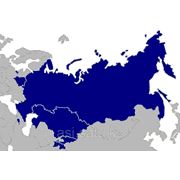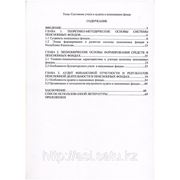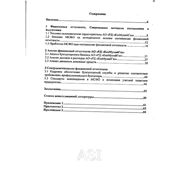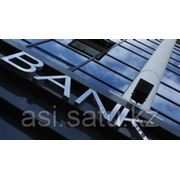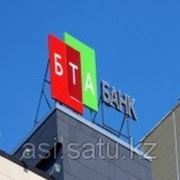The influence of the economic crisis on the credit system of the Alliance bank in Kazakhstan, Алматы
Описание товара
The influence of the economic crisis on the credit system of the Alliance bank in Kazakhstan
Contents
Introduction
Chapter 1. Theoretical foundation of the influence of the economic crisis on the banking system
- Formation and development of the economic crisis
- The influence of the economic crisis on banks of Kazakhstan
Chapter 2. Analysis
2.1 Analysis of influence of the economic crisis on the Alliance bank in Kazakhstan
2.2 The Credit system of the Alliance bank
Conclusion
References
Introduction
Kazakhstan's economic performance over the past eight years was celebrated as one of the most impressive among emerging markets worldwide. Growth of Kazakhstan's gross domestic product (GDP) averaged 10% per year in 2000-2007 after contracting by 4.5% on average per year in 1992-1999. The external trade balance turned from a deficit of 5% of GDP on average per year in the first eight years of independence into a surplus of 11% on average over the following eight years. The turnaround was equally impressive in the areas of fiscal consolidation and monetary stabilization. Thanks to economic growth and a real appreciation of the local currency Tenge, GDP per capita increased from $1,000 per year in 1999 to $6,800 in 2007. Kazakhstan had established itself as a mid- income country at par with countries like Malaysia and Thailand. It was the Snow Leopard catching up with the East Asian Tigers.
The factors behind this success story were not only policies that attracted the foreign funds needed to substantially increase the extraction of hydrocarbons and bring them to the market- other resource rich countries in the region have been much less successful here—and the unprecedented increase in global commodity prices. Kazakhstan also stood out through professional macroeconomic management and bold structural and regulatory reforms. Points in case are the establishment of a fully funded pension system in 1998, which is still the most impressive in a transition economy (by 2007 yearly contributions increased to 1.8% of GDP and assets under management to 9.5% of GDP); Kazakhstan's response in 1999 to spillover from the Russian financial crisis; the subsequent cleanup of its banking system, which became the most dynamic in the CIS; the establishment of a national wealth fund named National Fund in 2001 to accumulate excess oil earnings and tax revenues (funds under management increased to $21 billion or 20.3% of GDP by end-2007); the establishment of the first consolidated financial services regulator in a transition economy in 2004; and the build-up of the new capital Astana, which was a major logistical feat. Meantime, social and political stability were maintained, which was also a major achievement.
However, Kazakhstan is among the emerging markets most affected by the global financial turmoil since August 2007. What went wrong? How serious is the situation?
In August 2007, the Kazakhstani banking system was hit by liquidity problems in the US- American and European banking systems, which effectively shut down international credit markets. The Kazakhstani banking system had become vulnerable for such an exogenous shock. Since Kazkommertsbank issued its first Eurobond in 1998, all leading Kazakhstani banks had gained access to international capital markets and became increasingly dependent on it. Thanks to favorable company credit ratings and abundant global liquidity, cheap finance from abroad was readily available, mostly in form of Eurobonds and syndicated loans. Since end-2002, Kazakhstani banks increasingly used foreign funds to finance an aggressive credit expansion at home. Foreign liabilities of the banking sector increased from $1.8 billion (or 2% of GDP) in December 2002 to 43.5 billion (or 20% of GDP) in July 2007 (Chart 1). 58% of these liabilities were short- and medium-term syndicated and bilateral bank loans.
Over the same period, private sector credit grew from 19% of GDP to about 56% of GDP. This was still lower than in Thailand (84%) or Malaysia (105%), but almost at par with the USA (60%) and much higher than in most other successful transition economies such as the new European Union member country Czech Republic (41%). About half of the credit expansion in Kazakhstan was funded from abroad. Bank deposits also increased. However, they did not keep pace with the credit expansion. This means that fewer and fewer credits were backed by deposits. The private sector credit to deposit ratio increased from 125% in 2002, which was already high from an international perspective, to 198% in 2007. For comparison, Thailand had a ratio of 94% in 2007, Malaysia 91%, and developed economies like the USA or Germany of 57% and 115%, respectively.
REFERENCES
- President of the Republic of Kazakhstan having the force of law, from 24.04.95 № 2235 "On taxes and other payments to the budget."
- Republic of Kazakhstan Law № 355-1 ZRK of 03/31/1999 "On amendments and additions to the equations of Presidential Decree having the force of law" On tax-Gah and other mandatory payments to the budget »№ 2235 from 04.24.1995".
- RK Law № 357-1 ZRK of 04/01/2000 "On budget system".
- RK Law № 359-1 ZRK of 04/01/2000 amending and supplementing the Law of the Republic of Kazakhstan "On republican budget for 2007
- President of the Republic of Kazakhstan having the force of law, from 24.04.95 № 2235 "On taxes and other payments to the budget."
- Republic of Kazakhstan Law № 355-1 ZRK of 03/31/1999 "On amendments and additions to the equations of Presidential Decree having the force of law" On tax-Gah and other mandatory payments to the budget »№ 2235 from 04.24.1995".
- RK Law № 357-1 ZRK of 04/01/2000 "On budget system".
- RK Law № 359-1 ZRK of 04/01/2000 amending and supplementing the Law of the Republic of Kazakhstan "On republican budget 2001".
- Kovalev, VM The General Theory of Finance. - M., 1997
- Drozdov, GN The General Theory of Finance. - M., 1996
- Artemenko GN Financial analysis. - M., 1998
- Efimov, TP Financial control. - M., 1998
- Borisov, EF Economic theory. - M.: Yurist, 1997
- The course of economic theory. Ed. Chepourin MN, Kiseleva EA - Kirov: ASA, 1998.
- Sheremet AD. Sayfulin RS Finance companies. Textbook. Moscow: Infra-M, 1998.
- President's message to the people of Kazakhstan.
- Development Strategy 2030
- The economic security of the country: customs methods and means of ensuring it: Abstracts of scientific - practical conference. - Moscow: RIO RTA, 1995. 28. Legal Encyclopedia / under total. Ed. BN Topornina. M., 2001.
- Koshanov A. The integration of Kazakhstan into the international trading system and WTO / Al Paris. 1999. № 6. - S. 47-51.
- Ognivtsev VA World Trade Organization (WTO): the basic rules and norms, the question of accession. - Division of International Trade and natural resources, the secretariat of UNCTAD (UN Conference on Trade and Development). - Almaty, 1999, September. - S. 12.
- Khasanov, MA Kazakhstan's accession to WTO: opportunities and venture / Energy in Kazakhstan. 1999. № 6.
- World Trade Organization. Trade: Looking Ahead / 0bzor. 1995.
- The WTO. The Uruguay Round. Module 1: FAQs. Overview. Section: The WTO. Unit: WTO vs GATT. 1999.
- Chmel, GN Malaya Customs Encyclopedia, Ed. VG Draganov. M., 1997.
- Chernyshov SV Mechanism of regulation of international trade: the norms and rules of GATT: Sat. scientific publications. VNIKI, 1996. S. 29-30.
- Economics of Customs: Textbook .- method book. - Moscow: RIO RTA, 1997.
- G. Mueller, Gernon X., Miike G. Accounting: An International Perspective. Moscow: Finance and Statistics. 2006. - 138s.
- Barkhatov AP International Accounting: Study Guide. - Moscow: Publishing and Book Trade Center "Marketing", 2001. - 288.
- Anoufriev VE On reforming Kazakhstan's system of accounting and reporting. Bulletin of Accountant, 2005. Number 8 - with. 22-2
- Blake, J., Omata O. European accounting. Moscow: Filin, 2007. - 178s.
- Sokolov YV Accounting: From the origins to the present day: the manual. M: Audit: UNITY, 2006. - 317s.
- Stukov SA, Stukov LS International standardization and harmonization of accounting and reporting. MA: Accounting, 2003. - 144s.
- Kurmantaeva AS Accounting: the domestic system and international standards .- Karaganda, 2005. - 486s.
- Accounting Reform. / Comp. V. Skala and Dr. A.: Lem, 2005. - 48s.
- Needles B., Anderson, H., Caldwell D. Accounting Principles. M., 2003. - 168s.
- International Accounting Standards: A Textbook. allowance. - 3rd ed. Ed.
- Nurseitov EO Accounting in organizations. Almaty, 2007. - 472b.
- Kamyshanov PI, Barsukov IV, Gustyakov IM Accounting: the domestic system and international standards .- Moscow: ID FBK-PRESS, 2002 .- 520 sec.
- International Financial Reporting Standards .- A.: Asker, 2005. -518s.
- Guidelines on the Application of International Accounting Standard (IAS) 7 Statement of Cash Flows. " Recommended for use by Advisory Board of the Ministry of Finance of the Republic of Kazakhstan on accounting and auditing according to the protocol of 24.01.2005 N 1.
- Solov'eva OV Foreign accounting and reporting standards. - M.: Research Press, 2003. - 232C.
Похожие услуги от « ASI»
Услуги, похожие на The influence of the economic crisis on the credit system of the Alliance bank in Kazakhstan
Вы можете приобрести товар The influence of the economic crisis on the credit system of the Alliance bank in Kazakhstan в организации ASI через наш сайт. Стоимость составляет 30000 Тенге, а минимальный заказ - 1 шт. На данный момент товар находится в статусе "в наличии".
Предприятие ASI является зарегистрированным поставщиком на сайте BizOrg.su.
Служебная информация:
На нашем портале для удобства, каждой компании присвоен уникальный идентификатор. ASI имеет ID 161747. The influence of the economic crisis on the credit system of the Alliance bank in Kazakhstan имеет идентификатор на сайте - 7501511. Если у вас появились сложности при взаимодействии с компанией ASI – сообщите идентификаторы компании и товара/услуги в нашу службу поддержки пользователей.
Дата создания модели - 16/09/2013, дата последнего изменения - 20/11/2013. За это время товар был просмотрен 428 раз.
